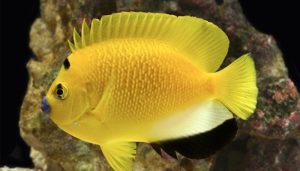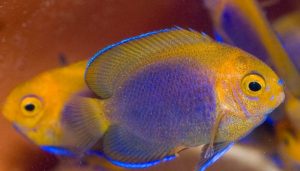Are you worried about your betta fish not eating and laying at top? As a betta fish owner, it can be concerning when your beloved pet shows unusual behavior.
If you have noticed your betta fish not eating and laying at the top of the tank, underlying issues may need to be addressed.
In this definitive blog post, we will discuss the top five reasons your betta fish may exhibit these symptoms and provide effective cures to help your fish return to its healthy and active self.
From poor water conditions to stress and illness, there are various reasons why betta fish may stop eating and lie at the top of the tank.

It can be a signal of swim bladder disease, constipation, bacterial or parasitic infections, aggressive betta fish tank mates, or even a result of overfeeding.
By understanding the root reason of the problem, you can take proactive steps to help make your Betta recover and thrive.
So, let’s dive into the five reasons your betta fish may not be eating and laying at the top of the tank and explore the cures to help your fish return to its happy and healthy self.
Table of Contents
ToggleIs Your Betta Fish Staying at the Top of the Tank?
If your betta fish stays at the top of the tank, it may indicate a problem with their health or environment.
Several factors can cause betta fish to stay at the top of the tank, including poor water quality, water temperature, swim bladder disorder, and aggressive tank mates.
It is so important to recognize the cause of the problem and take timely action to address it. This may involve performing regular water changes, adjusting the water level in the tank, providing appropriate tank mates, and treating any underlying health problems.
Maintaining a consistent water temperature between 75-80 degrees Fahrenheit is crucial. Lower temperatures can be fatal to bettas, weakening the fish’s immune system and making them more susceptible to diseases and infections.

Keeping the water aquarium temperature within the recommended range can help your betta fish stay healthy and active and prevent potential health issues caused by environmental stress.
Therefore, monitoring the water temperature regularly and making necessary adjustments to maintain a suitable and stable environment for your betta fish to thrive.
By following this procedure, you can guarantee that your betta fish remains healthy and active.
Are My Betta Fish Sleeping?
Betta fish sleep, but their sleep patterns may differ from other animals. They do not have eyelids, so they do not close their eyes while sleeping. Instead, they may appear to be resting at the bottom or top of the tank.
Their metabolism slows down during this time, and may become less active. Giving your betta fish a comfortable and safe tank environment, such as a cozy hiding place or a bed of plants, is vital.
If your betta fish appears to be sleeping more than usual, it might indicate a matter with their health or environment, and it is recommended to monitor their behavior closely.
Reasons Why Your Betta Fish Not Eating and Laying at Top
There are several reasons why fish laying at the bottom of the tank. Understanding these reasons can help fish owners identify the problem causes and take appropriate action.
– Poor Water Quality
Poor water quality is the most frequent reason Betta may lay at the bottom of the tank. Bettas require a clean and healthy environment to thrive, and if the betta tank water is not duly maintained, it can lead to various health problems. Poor water quality can cause stress, lethargy, and even illness in betta fish, which may cause fish laying on the bottom of the aquarium.
Solution: Keeping the tank water clean and properly maintained is essential. To ensure that your tropical fish remains healthy, You should perform regular water changes and monitor the water tank parameters to ensure they are within the appropriate range. Test the water with a reliable water testing kit to check the tank water’s pH, nitrite, nitrate, and ammonia levels.
– Swim Bladder Disorder
Another reason Betta lay at the bottom of the tank is the swim bladder issue. The swim bladder organ helps fish control their buoyancy and keep their position in the water. If the swim bladder is damaged or malfunctioning, it can cause the fish to float to the top or sink to bottom.
Solution: Unfortunately, there is no cure for a swim bladder, and it can be difficult to manage. However, there are some straightforward procedures that you can take to alleviate the symptoms. You can try feeding your betta fish a small amount of fish food several times a day rather than one large meal. This can help prevent bloating and constipation, exacerbating swim bladder disorder. You can also try setting the water level in the tank to help your fish maintain its position in the water.
– Inappropriate Tank Size
Betta fish are relatively small and do not require a large tank to thrive. However, it is still crucial to get your Betta with an appropriate tank size. If the tank is too small, the small tank can cause stress and discomfort for the fish, which may result in betta fish laying on bottom.
Solution: To ensure your betta fish remains healthy and active, provide them with an appropriately sized tank. A minimum betta tank size of 5 gallons is recommended for a single betta fish. You should also add plenty of hiding places and decorations in the tank to keep your fish entertained and stimulated.
– Aggressive Tank Mates
Betta fish are known for their offensive behavior and may not be compatible with all fish types. If the tank mates are too aggressive, it can cause stress and anxiety for the male Betta, which may result in them laying at the bottom of the tank.
Solution: When selecting tank mates for your betta fish, choosing fish compatible with their temperament is essential. Avoid placing aggressive fish such as cichlids and barbs in the same tank as your betta fish. Instead, opt for peaceful fish such as tetras and guppies.
– Sick Betta Fish
If your Betta is sick, it may exhibit unusual behavior, such as laying on bottom of tank. Several health problems can affect betta fish, including fungal and bacterial infections, parasites, and fin rot.
Solution: If you suspect that your betta fish is sick, it is essential to take immediate action to prevent the condition from worsening. You should isolate the sick fish in a separate tank and treat them using appropriate medication. You should also ensure that the tank water is properly preserved to prevent the spread of the disease.
Reasons Why Betta Fish Is Not Eating
In addition to Betta laying at the bottom of the aquarium, betta fish may also stop eating, which can be a worrying sign for fish owners. Here are some of the reasons why betta fish may not be eating.
Poor Water Quality
Poor water quality can also affect the appetite of betta fish. If the aquarium water is not clean and properly maintained, it can cause stress and illness in the fish, which may result in a change in eating habits.
Solution: To encourage your betta fish to eat, ensure the tank water is clean and properly maintained. You should perform regular water changes and monitor the water tank parameters to ensure they are within the appropriate range. You should also avoid overfeeding your fish and take off any leftover food from the tank to prevent it from fouling the water.
Stress
Stress can also cause betta fish to stop eating. Bettas are sensitive fish, and they can be quickly stressed out by changes in their environment, such as new tank mates, poor water quality, or a change in their diet.
Solution: To reduce stress in your betta fish, ensure the tank environment is clean, stable, and properly maintained. You should also avoid overstocking the tank and provide plenty of hiding spots and decorations for your fish. If you have recently introduced new tank mates, you should monitor their behavior to ensure they are not causing fish to become stressed.
Inappropriate Diet
Betta fish require a balanced and varied diet to remain healthy. If the fish is not receiving the appropriate nutrients, it may stop eating. Bettas are predatory fish and require a diet that is high in protein.
Solution: To ensure that your betta fish receives the appropriate nutrition, you should feed them a varied diet that includes high-quality pellets, frozen or live foods such as brine shrimps and bloodworms, and occasional treats such as daphnia and mosquito larvae. You should also avoid overfeeding your fish, leading to digestive problems and obesity.
Illness
Illness can also cause betta fish to stop eating. Several health matters can affect betta fish, including bacterial and fungal infections, parasites, and swim bladder disorder.
Solution: If you suspect your betta fish is sick, it is important to take immediate action to prevent the condition from worsening. You should isolate the sick fish in a separate tank and treat them using appropriate medication.
New Environment
If you recently introduced a new betta fish to your aquarium, bettas may take some time to acclimate to their new environment. During this time, they may encounter unusual eating behavior.
Solution: To help your new betta fish adjust to their new environment, ensure the tank is properly cycled, and the water parameters are within the appropriate range. You should also provide them plenty of hiding places and decorations to reduce stress.
Cure for Betta Fish Not Eating and Laying at Top
If your fish is not eating and laying at the top or bottom of tank, there are some easy-to-follow tips to help cure the problem.
– Check Water Parameters
The first step is to test the tank parameters in the tank. Poor water conditions can cause a range of health problems in betta fish, including lethargy and loss of appetite. Use a reliable water testing kit to check the tank water’s pH, ammonia, nitrite, and nitrate levels. If the aquarium parameters are not within the appropriate range, perform a water change and adjust the parameters accordingly.
– Adjust Tank Environment
If the tank environment is causing stress to your betta fish, you should adjust the tank setup. Provide your fish with plenty of hideouts and decorations to reduce stress, and ensure that the tank is properly cycled and the water parameters are within the appropriate range.
– Feed Your Betta Fish Appropriately
Betta fish need an appropriate and varied diet that includes high-quality pellets, frozen or live foods, and occasional treats. Avoid overfeeding your Betta, which can lead to digestive problems and obesity.
– Treat Illness
If your betta fish is sick, isolating them in a separate tank and treating them using appropriate medication is important. Ensure that the tank water is clean and properly maintained to stop the spread of the disease.
– Seek Professional Help
If your Betta is not responding to treatment, or you are unconfident of the problem source, seek professional vet help from a veterinarian or a knowledgeable pet store.
Is It Normal For Bettas To Lay On The Bottom Of Tank?
It is not normal for Betta to constantly lay on the bottom of the tank. If a betta fish is laying on the bottom of the tank for extended periods, it may indicate a health problem or environmental issue.
Poor water quality, swim bladder disorder, inappropriate tank size, aggressive tank mates, or illness are common reasons betta fish may lay on the bottom of the tank.
Identifying the cause of the matter and taking appropriate steps to address it is significant. This may involve performing regular water changes, adjusting the tank environment, providing appropriate mates, and treating underlying health conditions.
Why Is Your Betta Fish Laying On Its Side?
If your fish is laying on its side, it may indicate a serious health problem. Betta fish laying on their side may suffer from swim bladder disorder, an internal bacterial or parasitic infection, or other illnesses.
Swim bladder disease is a frequent problem in betta fish and can cause them to lose their equilibrium and float or sink to the bottom or surface of the tank.
It is important to address the implicit cause of the problem promptly. This may involve changing the tank environment, providing appropriate nutrition, and administering medication. Consulting with a veterinarian or fish expert may also be necessary.
Conclusion
Betta fish are beautiful and fascinating creatures but require proper attention to remain healthy and active. If your Betta is not eating and laying at top or bottom of the tank, it can be a worrying sign for fish owners. By understanding why healthy Betta may exhibit these behaviors and taking appropriate action, you can help ensure that your fish remains healthy and happy. Remember to keep the tank water clean and properly maintained, provide your fish with an appropriate diet and tank environment, and seek professional help. Your bettas can live a healthy life; take care of your Betta.
You might also like
- Why Do My Betta Fish Stay at the Bottom of the Tank: (FAQ)
- Betta Changing Color and Laying on Bottom of Tank: (Solved)
- Is My Betta Fish Dead or just Sleeping: (7 Signs to Look Out For)
- Betta Swimming Bladder Disease: (7 Symptoms & Best Treatment)
- Why Is My Betta Fish Not Moving? 5 Common Reasons (Solved)
- Do Betta Fish Sleep: 3 Ways to Catch Them Snoozing!
- 10 Essential Steps for Setting Up a Betta Fish Tank Like Pro
- What Does a Betta Fish Bubble Nest Look Like: A Surprising Truth!




